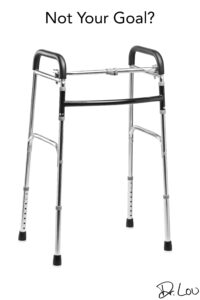If you want to avoid needing a walker, this is a good place to start.

If you don’t want one of these, ask yourself if you are willing to do something to prevent it. Or, are you just going to roll the dice? Don’t leave your future to luck when you can influence outcomes.
Nobody ever plans or aspires to need a cane, a walker or a wheelchair. They go about their lives, feeling relatively ok, and then one day, something happens and there’s a loss of independence. Ask any older person of their greatest fears and apart from death, the fears are loss of independence and being a burden on a child.
These five action steps will help build the health and adaptability you need to do your best to avoid a walker or wheelchair.
- Exercise. Exercise creates strength and body awareness. Body awareness can be balance and spacial awareness of your body in relationship to your environment. Think “Feet in relation to the ground.” Strength and body awareness will help you avoid the type of fall that could land you in the grip of a walker. Exercise also promotes circulation and cardiovascular health. Few things lead to having to re-learn how to walk, like a stroke. If you have a walker already, you can exercise with your walker!
- Stop Smoking (period) & Drinking in excess. Anything, including diet, that may lead to poor health in your heart and blood vessels, is bad. The risk of stroke is real. Having a stroke can damage your brain and it’s ability to control movement throughout your body. Sometimes you are considered “lucky” to be able to move with a walker after a stroke. Sometimes you don’t move at all.
- Chiropractic Care For Life. Chiropractic care manages your body’s ability to move, hold itself upright and most importantly, aims to optimize brain and nerve control over your entire body. Not only are all your organs like your stomach and heart controlled by your nervous system, so is your balance, reflexes, mobility, speed, and ability to heal! If your spine or pelvis is misaligned in a way that diminishes nerve control, you may be more likely to lose your balance, fall, break a hip and recover so slowly that you end up needing the help of a walker. Chiropractors connect your brain to your body, and your body to better biomechanics, better overall function, and better healing.
- Support your feet. Your feet are your foundation and they are your link to the ground. They send messages to your brain about what you are standing on and how you are standing, walking, running, jumping on that surface. If your feet are flat, damaged or dysfunctional, your messages and control may be inadequate. Flat feet also create instability and stress on your ankles, knees, hips and spine. All of these issues, independently or as a group, make you more susceptible to a fall or injury that will require the use of a walker. Support for your feet could also include wearing spikes on your shoes in the winter. Slipping on the ice in colder climates is a leading cause of hip and pelvic fracture and could lead to dependence on a walker, cane or wheelchair.

Actions influence outcomes. How do you care for the bones that protect your spinal cord, provide movement and bending, and that provides you with stability? Your spine and nerves need a chiropractor.
Staying strong, well supported and healthy on the inside, will help you avoid a life of dependence on walking supports and other people. The earlier you begin training your body, the better adapted and more resilient it will be when you are older.
What can you do if you are already using a walker or a cane and you live in Portland? You should be evaluated by a Portland chiropractor. They will tell you if there is any hope for ditching the walker or cane.
